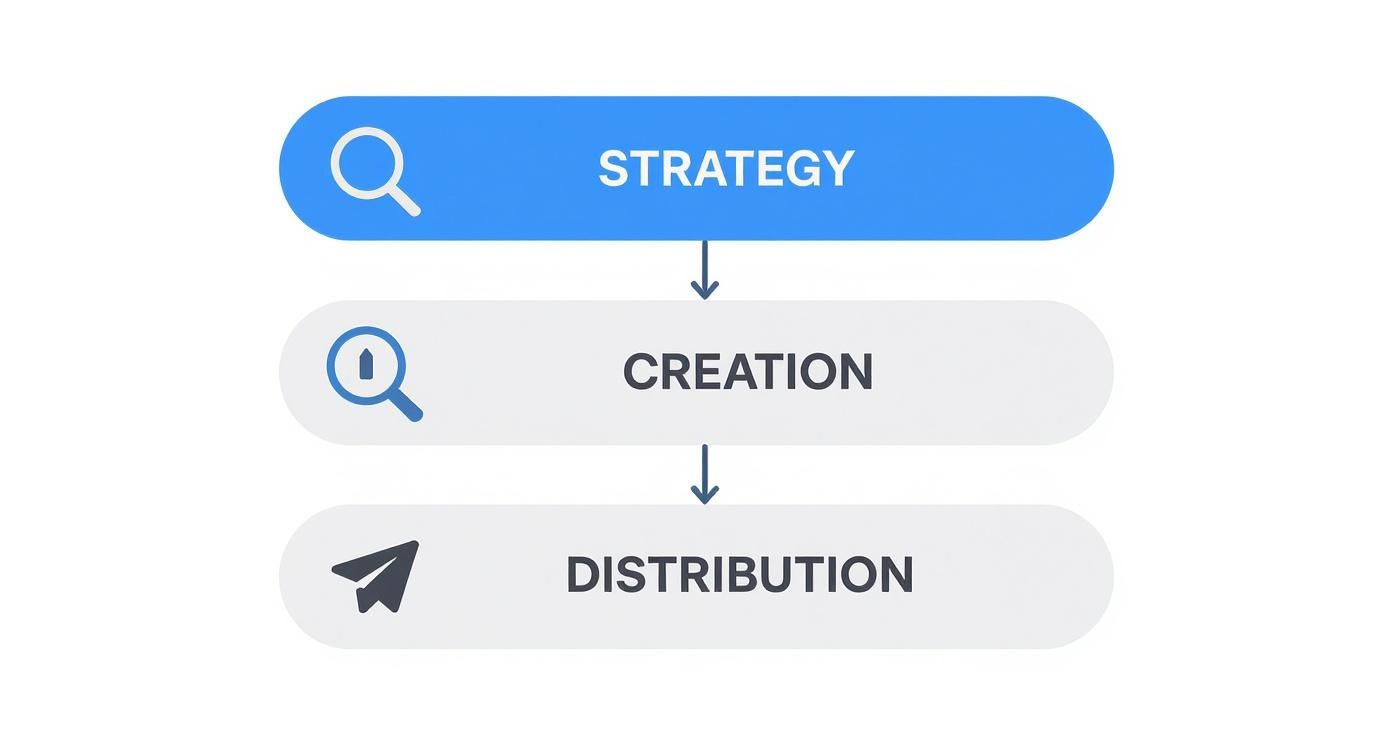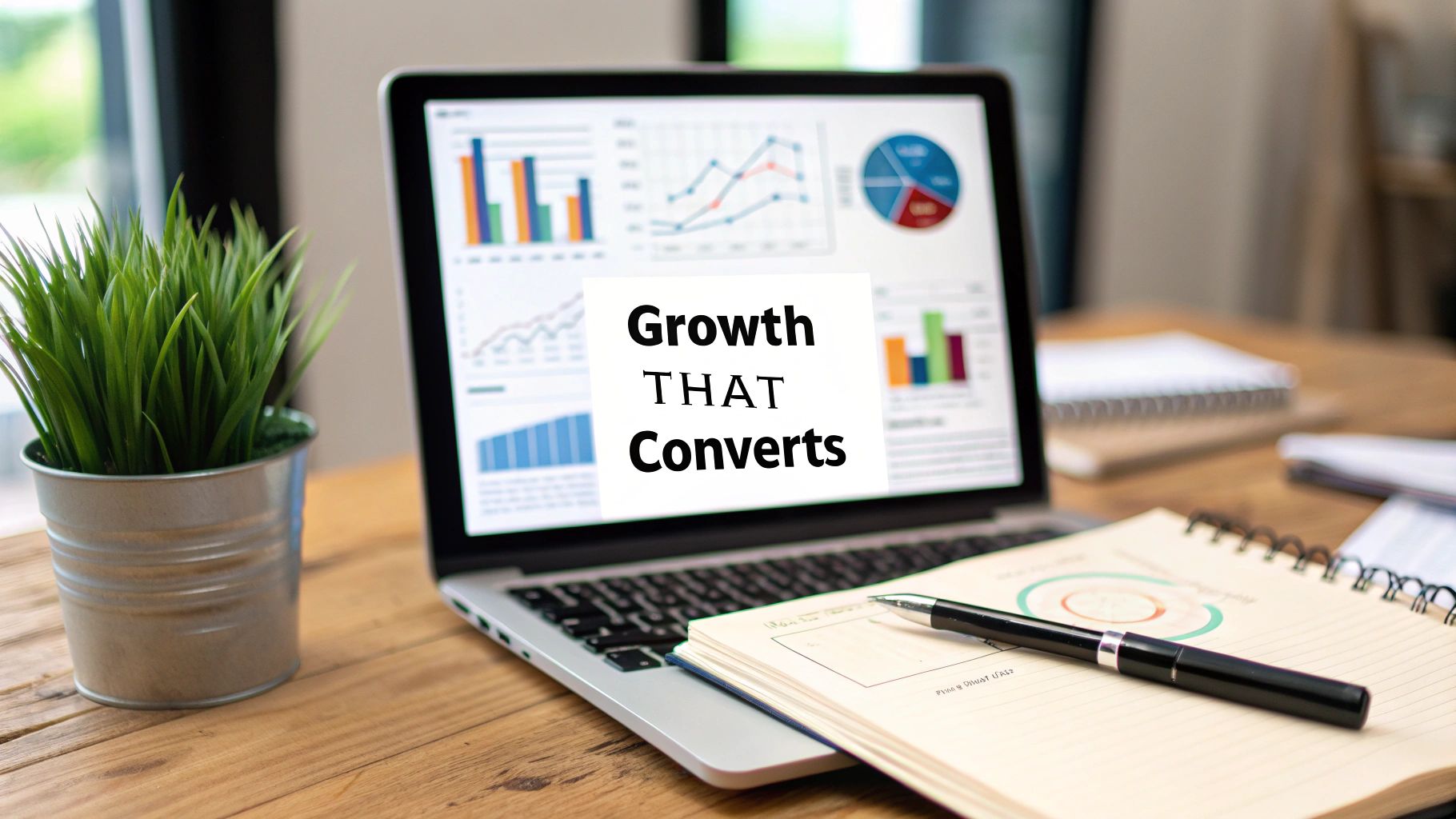B2B content marketing services aren't just about churning out blog posts. They’re specialized programs built to create and share valuable content that attracts, engages, and ultimately converts other businesses into clients. Instead of just writing, these services handle the entire lifecycle—from research and creation to promotion—all designed to build your company's authority and drive real, measurable growth.
What Are B2B Content Marketing Services, Really?

Think of it like hiring a master architect for your brand’s digital presence. They don’t just show up with a pile of bricks (a bunch of random blog posts or videos). Instead, they design the entire building—a strategic content ecosystem engineered to attract, engage, and convert high-value business clients.
This approach goes way beyond simple content creation; it’s about turning your content into a genuine growth engine for your company. It’s the difference between shouting into the void and starting meaningful conversations with your ideal customers.
More Than Just Words on a Page
A common mistake is thinking these services just provide writing. In reality, a great service acts as a strategic partner laser-focused on business outcomes. Their work is grounded in a deep understanding of the long, complex B2B sales cycle, where decisions are driven by logic, trust, and a clear ROI.
B2B content marketing services are designed to build relationships and rapport with other businesses by sharing useful information, solving problems, and answering questions—ultimately establishing your company as a trusted advisor.
The content itself is a tool, not the final product. Every single piece is crafted to address the specific pain points and challenges your target audience is wrestling with. This focus on education and problem-solving is what makes effective content marketing for B2B so different from old-school advertising.
Building a Foundation for Growth
A smart service doesn't just chase quick wins; it lays a foundation for sustainable, long-term lead generation. The goal is to build your brand’s authority over time, making you the go-to resource in your industry. This requires a multi-faceted approach:
- Deep Audience Research: Pinpointing the exact needs, motivations, and questions of the decision-makers you want to reach.
- Strategic Content Planning: Creating a clear roadmap that maps content to every stage of the buyer's journey, from initial awareness to the final signature.
- Expert Content Creation: Developing authoritative assets like white papers, in-depth guides, case studies, and webinars that prove you know your stuff.
- Intelligent Distribution: Making sure your content actually reaches key decision-makers on the platforms they trust, like LinkedIn or niche industry publications.
Getting a handle on the core elements of a successful B2B content marketing strategy is key when you're looking at different service providers. At the end of the day, their job is to generate qualified leads who are already convinced of your expertise before they ever talk to a salesperson.
The Anatomy of a High-Impact B2B Content Service
When you hire a B2B content marketing service, you’re not just buying articles and videos. You’re commissioning a strategic system designed for one thing: growth. A truly high-impact service is made of several interconnected parts, each one essential for turning your expertise into a machine that generates leads.
Think of it like building a high-performance engine. You can't just throw random parts together and hope it roars to life. Every component—from the pistons to the spark plugs—has to be engineered and integrated perfectly to deliver power and efficiency. Content marketing is no different.
The Strategic Blueprint
Before a single word gets written, a top-tier service lays a rock-solid foundation. This is easily the most critical phase, because it sets the direction for the entire campaign. A good blueprint prevents you from just creating random acts of content and ensures every single piece works toward a specific business goal.
This strategic phase usually includes:
- Deep Audience Research: This isn't just about demographics. It’s about figuring out who your customers are and what keeps them up at night. It involves creating detailed buyer personas and mapping out their specific pain points and questions at every stage of their journey.
- Competitive Gap Analysis: A smart agency analyzes what your competitors are doing well, but more importantly, where they’re dropping the ball. This is how you uncover opportunities to create content that fills a huge void in the market and establishes you as the go-to authority.
- Keyword and Topic Strategy: This goes way beyond chasing basic keywords. The goal is to build "topic clusters" that position your brand as an expert on broad subjects, not just individual search terms. This approach gives your SEO performance a massive boost and builds genuine trust with readers.
The Content Creation Engine
With a clear strategy locked in, the focus shifts to creating assets that actually connect with a sharp B2B audience. We’re not talking about generic, fluffy blog posts here. This is about producing authoritative, problem-solving content that builds credibility and pushes people to act.
A lot of marketers know this is the goal, but execution varies. For instance, while 73% of B2B marketers use content marketing, far fewer have a documented strategy guiding it. When it comes to what actually works, 58% find video most effective for engagement, with case studies following closely at 53%—which makes sense, given that B2B buyers crave tangible proof.
A great content service doesn't just create content; it engineers solutions. Each asset—from a detailed white paper to a compelling case study—is a tool designed to move a potential customer one step closer to a decision.
This creation phase is where you can get really creative. To see just how varied your content formats can be, check out our guide on innovative content creation ideas.
To give you a clearer picture, here’s a breakdown of the core services you should expect from any serious B2B content marketing provider.
Essential Services in a B2B Content Marketing Package
Ultimately, these components work together as a system. Without a solid strategy, creation is aimless. And without effective distribution, even the best content goes unseen.
Intelligent Distribution and Promotion
Creating amazing content is only half the battle. Seriously. If your target audience never sees it, all that effort was for nothing. This is where intelligent distribution comes in. A comprehensive service builds a multi-channel plan to get your content in front of the right decision-makers, right when they need it.
This usually involves a mix of three key tactics:
- Owned Media Promotion: Making the most of the channels you already control, like your company blog, email newsletter, and corporate social media accounts.
- Earned Media Outreach: Building real relationships with industry publications, influencers, and partners to score valuable backlinks and mentions that build authority.
- Paid Amplification: Using platforms like LinkedIn Ads or targeted PPC campaigns to get immediate eyeballs on your most valuable content pieces and accelerate lead generation.
By weaving these three pillars—strategy, creation, and distribution—together, a B2B content marketing service builds a sustainable system for attracting and converting high-value clients.
Why Smart Companies Outsource B2B Content
So, should you build a content team in-house or partner with a specialized service? It’s a huge strategic question. For a lot of businesses, outsourcing isn't just about handing off tasks—it's about grabbing an immediate competitive edge. Tapping into B2B content marketing services gives you instant access to expertise without the high costs and slow ramp-up time of hiring a full-time team.
Think of it this way: instead of spending months finding, hiring, and training individual writers, editors, and SEO specialists, you get to plug into a high-performance engine that’s already built and running. This lets you scale your content production up or down with incredible speed, whether you're gearing up for a big product launch or just reacting to a shift in the market.
Gaining Expertise and Efficiency
The number one reason to outsource is specialization. Let's be honest, in-house teams often wear a dozen different hats, juggling content with social media, email campaigns, and whatever else comes up. An external partner, on the other hand, lives and breathes content strategy. They bring a deep, almost instinctual understanding of what works across different industries and have battle-tested processes for everything from research to distribution.
This specialization creates some serious efficiency. While an in-house employee is busy switching between priorities, an agency is 100% focused on delivering results based on the KPIs you agreed on. That singular focus almost always translates to a faster and more predictable return on your investment.
The infographic below breaks down the core pillars that a dedicated B2B content service manages, from the initial strategy all the way to final distribution.

As you can see, it's a cohesive system. Everything builds from a strategic foundation, moves into expert creation, and finishes with targeted distribution to make sure the content actually gets seen and makes an impact.
Driving Tangible Business Outcomes
Beyond just being efficient, outsourcing is a powerful tool for hitting specific business goals. A steady stream of expert content can shorten those notoriously long B2B sales cycles by educating prospects and building trust long before they ever talk to a salesperson. It also improves lead quality by attracting visitors who are actively searching for the exact solutions you offer.
The data backs this up. An overwhelming 84% of businesses now prefer to outsource their content creation. This isn't a random trend; it's fueled by real results. Marketers report that 83% successfully build brand awareness, and 77% build that all-important credibility and trust through their content. You can dig into more details in this report on 2025 B2B marketing statistics from leadforensics.com.
When you outsource, you're not just buying articles. You're investing in a strategic system designed to build a powerful brand moat that competitors can't easily cross, establishing your company as the definitive authority in its field.
At the end of the day, leveraging expert B2B content marketing services turns content from a line item expense into a predictable revenue driver. It frees up your internal team to focus on what they do best while a dedicated partner builds your brand's authority and keeps your sales pipeline full.
Finding the Right B2B Service Model for You

Picking a partner for your B2B content marketing services isn’t a one-size-fits-all deal. How you work with them—the service model—has a huge impact on your budget, workflow, and the results you'll see. Getting familiar with the common setups is the first step to finding a perfect match for your goals and team.
Think of it like getting around town. Do you need a dedicated chauffeur on call 24/7 (a full-service agency), a taxi for a specific trip (a project), or a reliable daily commuter car (a retainer)? Each one gets you where you need to go, but the right choice depends entirely on your destination and how you like to travel.
Project-Based Engagements
A project-based model is clean and simple. You hire an expert or a team to handle a specific, well-defined task with a clear start and finish line. This is perfect for one-off needs where you know exactly what you want to achieve.
- Best For: A company launching a new product that needs a complete content package—think a white paper, a series of blog posts, and an email nurture sequence to support it.
- Pros: The costs are predictable and the deliverables are crystal clear. It's a great way to test out a new partnership without locking into a long-term contract.
- Cons: It's not built for the long haul. Once the project is over, the engagement ends, leaving you to figure out what comes next.
This approach is fantastic for plugging immediate gaps or knocking out a big, standalone initiative. It’s just not designed to build the consistent momentum that drives real organic growth over time.
Monthly Retainer Model
The retainer is the most common way to do ongoing content marketing, and for good reason. You pay a set monthly fee for an agreed-upon scope of services or a dedicated chunk of the provider's time. This creates a predictable, steady partnership.
This model is all about playing the long game. It lets your provider get deeply embedded with your team, learn the quirks of your business, and constantly tweak the strategy based on what the data is telling them. It turns the relationship from a simple transaction into a genuine partnership focused on building results month after month.
The retainer model is the engine of sustainable B2B content marketing. It provides the consistent fuel needed to build brand authority, improve SEO rankings, and nurture leads month after month.
Here’s a quick breakdown of how the three main models stack up:
Full-Service Agency Partnership
Finally, there’s the full-service agency model—the most comprehensive option on the table. With this, you’re essentially outsourcing your entire content marketing department. The agency takes care of everything from high-level strategy and audience research to content creation, distribution, analytics, and reporting.
This all-in-one approach is ideal for companies that don't have an in-house marketing team or want to scale up fast without the overhead of hiring. You get instant access to a whole crew of specialists—strategists, writers, SEOs, designers—all working together. While it’s the most expensive option, it also offers the highest potential for deeply integrated, impactful results.
How to Measure Your Content Marketing ROI

Let's get straight to what really matters: results. Pouring money into B2B content marketing services is a serious business decision, not a creative experiment. You need a rock-solid way to prove it's actually working.
Forget about vanity metrics like "likes" and "shares." We're talking about connecting the dots between your content investment and your bottom line. Measuring ROI is a bit like being a detective—you have to follow the clues all the way from the first blog post a prospect reads to the final signed contract.
This means tracking different things at different stages of the funnel.
Top-of-Funnel Awareness Metrics
At the top of the funnel (ToFU), the goal isn't to make a sale. It's to show up where your future customers are looking for answers and get them to pay attention. Success here is measured in reach and authority.
The key numbers to watch are:
- Organic Traffic: Are more people finding you through Google? An uptick here means your SEO-focused content is hitting the mark.
- Keyword Rankings: Are you climbing the search results for the terms your customers actually use? This shows you're becoming a trusted voice on topics that matter.
- Backlinks Acquired: When other credible websites link to your articles, it's a massive vote of confidence that tells search engines you're the real deal.
Think of these as the early warning signs of a healthy sales pipeline. They prove your content is breaking through the noise and pulling the right people into your world.
Mid- and Bottom-Funnel Conversion Metrics
Once you have someone's attention, the game changes. Now, your metrics need to shift from eyeballs to action. This is where you connect content to real business outcomes and see if your service provider is actually delivering value.
A huge mistake is to stop tracking at website traffic. The real ROI is found when you connect content consumption to qualified leads, pipeline, and closed deals. That means your marketing and sales data have to be talking to each other.
Here are the conversion metrics that count:
- Lead Generation: How many people downloaded that ebook or signed up for your webinar after reading a blog post?
- Marketing Qualified Leads (MQLs): Of those downloads, how many actually fit your ideal customer profile and are worth a salesperson's time?
- Marketing-Attributed Pipeline: What's the total dollar value of sales opportunities that were touched by your content along the way?
- Customer Acquisition Cost (CAC): A killer content program should make it cheaper to acquire new customers over time, not more expensive.
Despite how critical this is, a lot of companies are flying blind. Only 43% of B2B marketers actively track their content ROI, even though 76% of companies using marketing automation see a positive return within the first year.
Ultimately, you need a clear framework for measurement. If you want to go deeper, check out our full guide on how to calculate your content marketing return on investment.
Choosing the Right B2B Content Marketing Partner
Finding the right team for your B2B content marketing services isn’t like hiring just another vendor. It's more like bringing on a strategic partner.
This is a critical decision. The right agency becomes a true extension of your business, someone who’s just as invested in your growth as you are. You need to look past the slick sales deck and find a team that gets the tiny details of your industry and understands the long, winding journey your B2B buyers take.
Key Evaluation Criteria
When you start talking to potential partners, your focus should be on hard proof—not just promises. A great agency won't hide its methods. They'll be excited to show you how they work and what they’ve accomplished for businesses just like yours.
Here are a few things that are absolutely non-negotiable:
- Real-Deal Industry Expertise: Have they actually worked in your world before? An agency that already knows your industry's language, trends, and customer pain points can start delivering value from day one, not six months in.
- A Portfolio Packed with Measurable Results: Forget vanity metrics. Look for case studies that show real business impact—things like a jump in organic traffic, a steady flow of qualified leads, and climbing keyword rankings.
- A Clear, Documented Strategic Process: Ask them to walk you through their entire process, from strategy and creation to distribution and reporting. A clear, repeatable system is the sign of a professional team, not one making it up as they go.
The best B2B content marketing partner doesn't just hand you a blog post. They deliver a clear, data-backed strategy built to hit specific business goals. Their success should be tied directly to yours.
Questions to Ask Potential Partners
To get past the surface-level answers, you need to ask questions that show you how they think and operate.
- How are you going to measure the ROI of our content program?
- What does your typical client communication and reporting schedule look like?
- Can you show us a content strategy you built for a company that was facing the same challenges we are right now?
Their answers will tell you everything you need to know. You'll get a real sense of their strategic depth and see if their communication style fits with your team, helping you make a decision you can feel good about.
Got Questions? We've Got Answers
Stepping into a partnership for B2B content marketing services always brings up a few key questions. Here are the straight-up answers to what business leaders usually want to know.
How Much Do B2B Content Services Actually Cost?
This is the big one, and the honest answer is: it varies a lot. The cost really depends on what you need and who you're working with.
A one-off project, like a deep-dive white paper, might run you a few thousand dollars. If you're looking for ongoing strategy and content creation, a monthly retainer can range anywhere from $5,000 to over $25,000 per month. That price tag climbs based on the provider's experience and just how much work is on their plate. A full-service agency acting as your outsourced marketing department? They'll naturally be at the top end of that spectrum.
How Long Until We See Real Results?
Let's be clear: content marketing is a long game, not a quick win. While you might see some early buzz, like a jump in social media engagement in the first month, the real business impact takes time to build.
Expect to see noticeable lifts in organic traffic and better keyword rankings within 3-6 months. The bigger wins—like a steady stream of marketing-qualified leads (MQLs) and a clear ROI—usually start to show up between 6-12 months.
Patience is the name of the game here. You’re building an asset that pays dividends for years, not just weeks. Think of it as building a competitive moat around your business.
What’s Our Role When We Hire an Agency?
It’s all about partnership. The best results happen when we work together, not in a silo.
Your main job is to be the subject matter expert. You bring the deep-down industry knowledge, customer insights, and internal data that an agency simply can't guess. Your team will usually jump in on:
- The initial strategy and kickoff calls.
- Reviewing and giving the thumbs-up on content drafts.
- Hopping on interviews for case studies or expert-led articles.
- Giving feedback on the monthly performance reports.
A great partnership frees you up to run your business while the agency does the heavy lifting on getting your content out there.
Ready to turn your B2B SaaS expertise into a lead-generation machine? PimpMySaaS specializes in strategic content that builds authority and drives growth. See how we can elevate your brand.
